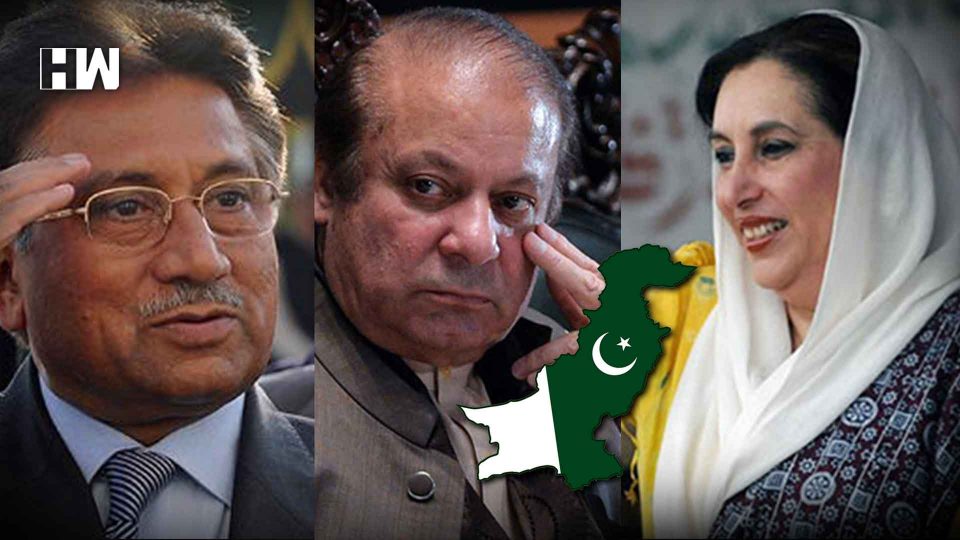As the people of Pakistan are all set to go to polls today in order to vote for their preferred candidate to fill in the post of the Prime Minister of the country, It is interesting to note that Pakistan seems to be under an unusual jinx wherein no Prime Minister has ever completed a single tenure since the inception of the nation 70 years ago.
The political situation in Pakistan has had a bumpy ride ever since 1947, as four times democratic governments were thrown away by military dictators, one prime minister was murdered while another was hanged by the judiciary, while many were sent home by presidents and one was dismissed by the Supreme Court. However, never in the history of Pakistan, the Supreme Court of Pakistan has sent home a PM under Article 184-3 of the constitution which is the suo moto jurisdiction.
Pakistan’s first Prime Minister, Liaquat Ali Khan, was assassinated four years and two months into his tenure.

His successor, Khawaja Nazimuddin, was deposed by Governor General Malik Ghulam Muhammad, only 18 months after he attained office. He was replaced by a relatively unknown politician Muhammad Ali Bogra as the Prime Minister.
Bogra was again dismissed by Malik Ghulam Muhammad in 1954 following which elections were held. The Muslim League suffered a defeat in the polls. But, Bogra was reappointed as the Prime Minister of Pakistan and headed a minority government. Bogra was ultimately deposed by Iskander Mirza in August 1955. Iskander Mirza was the last Governor General and first President of Pakistan when its Constitution was promulgated in 1956.

Chaudhary Muhammad Ali succeeded in becoming the PM in 1955 but because of his conflict with Iskender Mirza who had become president as a result of 1956 constitution, Muhammad Ali resigned on September 12, 1956. Hussain Shaheed Suhrawardy was the leader of Awami League and led the party through a victory in the 1954 elections for Constituent Assembly. Ibrahim Ismail Chundrigar was the first person from another party than Muslim League to be appointed as a Prime Minister in 1956. He was deposed in 1957, due to differences with Iskander Mirza.
Chundrigar’s successor, Feroz Khan Noon remained popular with Mirza, until Ayub Khan carried out his famous military coup in 1958. Immediately after the coup, Khan made himself interim Prime Minister for five days between 24 and 28 October 1958, and compelled Mirza to step down, before appointing himself, President. The post of Prime Minister was subsequently abolished and the seat of authority rested with the President from here on.
After thirteen years of Martial Law, Zulfikar Ali Bhutto succeeded to power. Bhutto remained President under special arrangement till 1973 Constitution was passed. He resigned as president to become the prime minister of Pakistan after the 1973 Constitution.

He went into elections in 1977 and succeeded but was deposed the same year through coup d’état by General Muhammad Ziaul Haq in July 1977. He was hanged in 1979 by all-powerful military-judicial nexus.
Pakistan got its next Prime Minister in 1985 in Muhammad Khan Junejo, who was dismissed by Zia ul Haq in May, 1988. Zia ul Haq died in August 1988. The same year in December, Pakistan got its only female Prime Minister in Benazir Bhutto, who remained in office for about 20 months.
Ghulam Mustafa Jatoi served as a caretaker PM for three months in 1990 before Nawaz Sharif was elected as the Prime Minister for the first time in November 1990. About two-and-a-half years later, Sharif government was dismissed only to be restored after a month by the Supreme Court. Balakh Sher Mazari served as the PM in between.
Mian Nawaz Sharif again became PM of Pakistan as a result of February 1997 election but on October 12, 1999, General Pervez Musharraf imposed emergency in the country and threw Nawaz Sharif out of the power.
Between 2002 and 2013, Pakistan saw a rule of seven Prime Ministers, with Yousaf Raza Gillani’s tenure of four years and three months being the longest. Sharif won the elections in 2013 with a thumping majority and returned to the office of Prime Minister for the third time, before resigning, after the Supreme Court’s verdict on the corruption charges against him.

Nawaz Sharif has a unique record: he is the first prime minister to be elected thrice but has not been able to complete even one term.
On April 13, 2018, the Supreme Court gave the ruling: The disqualification of any member of parliament or a public servant under Article 62 (1)(f) in the future will be “permanent”. Such a person cannot contest elections or become a member of parliament.
In 70 years, much changed but nothing really changed. The last two governments are the first two governments to finish their full tenure, but one thing remains unaltered: not one of the 29 prime ministers of Pakistan in its turbulent, bizarre and utterly intriguing 70-year political history has finished his/her full term. Not one.
As an independent media platform, we do not take advertisements from governments and corporate houses. It is you, our readers, who have supported us on our journey to do honest and unbiased journalism. Please contribute, so that we can continue to do the same in future.

